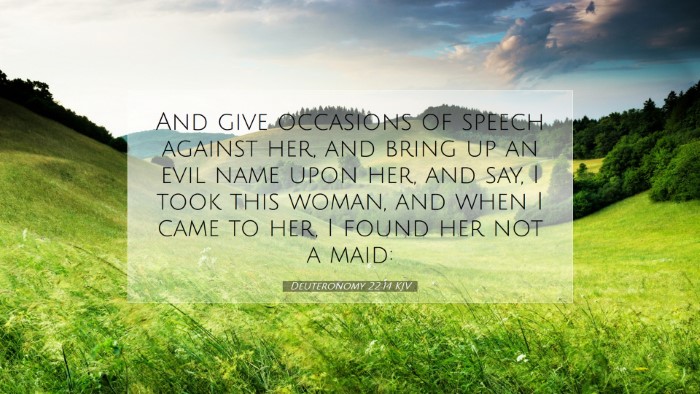Commentary on Deuteronomy 22:14
Verse Reference: Deuteronomy 22:14 - "And give occasions of speech against her, and bring up an evil name upon her, and say, I took this woman, and when I came to her, I found her not a maid." (KJV)
Contextual Overview
Deuteronomy 22:14 is part of a series of laws concerning morality, family, and the treatment of others in Israelite society. Surrounding verses address various forms of sexual morality, family rights, and social justice. This particular verse is situated within the legislation regarding marriage, and specifically the circumstances that may bring shame or reproach upon a woman.
Matthew Henry's Insights
Matthew Henry categorizes this verse under laws protecting the sanctity and honor of Israelite women. He emphasizes that accusations of a woman not being a virgin at the time of marriage were taken very seriously. If a husband made such a claim, he carried a weighty obligation to support it with credible evidence.
- Protection of Women's Honor: Henry points out that a woman's reputation was crucial in society. The law ensured that false accusations could not go unpunished, thereby maintaining justice.
- Responsibilities of Husbands: The husband is depicted as having a significant burden if he chooses to challenge the character of his bride. This underscores the seriousness with which marital commitments were viewed.
- Legal Structure: According to Henry, this law illustrates the legal protections available for women to prevent slander and maintain their dignity.
Albert Barnes' Analysis
Albert Barnes frames this verse within the broader context of ancient Near Eastern customs and contrasts them with the moral expectations laid out in the Mosaic law. He comments on the implications of dishonor and the need for verification in marital claims.
- Verification of Claims: Barnes notes the provision for fathers and families to respond to accusations, indicating the importance of truth over mere suspicion.
- Judicious Use of Authority: He discusses the implications of having authority within familial relationships, urging men to exercise caution and fairness, lest they bring unjust shame upon their wives.
- Social Implications: The accusation led to public scrutiny, reinforcing the idea that a woman’s reputation has communal significance. Hence, society was called to uphold moral standards.
Adam Clarke's Commentary
Clarke provides a pastoral approach, calling attention to the tenderness required in marital relations. He contextualizes the verse by pointing out the severe consequences of slander in relationships.
- Implications of Slander: Clarke asserts that to accuse a woman falsely not only harms her but also reflects poorly on the accuser. He contends that such actions contribute to a cycle of sin that can affect generations.
- Marriage as Sacred: The sanctity of marriage is emphasized, highlighting that accusations should not be taken lightly and should be approached with humility and love.
- Redemptive Approach: Clarke urges men to seek reconciliation and understanding rather than punitive actions that could devastate families.
Theological Reflections
This verse invites deeper reflection on the nature of truth, justice, and human relationships. It implies a moral imperative to uphold integrity and honor within the social fabric.
- Integrity in Relationships: The standards set forth in Deuteronomy illuminate God’s design for marriage as one of mutual respect. Accusations should be grounded in truth rather than suspicion.
- Restorative Justice: This passage speaks volumes about the principle of restorative justice in human relationships, where the aim is reconciliation over mere punishment.
- Impact on Community: The communal implications of personal acts highlight the interconnectedness of individuals within societies, echoing Christ’s teachings on love and honesty.
Practical Applications
For pastors and theologians, this verse serves not only as a historical account but as a timeless lesson on ethics and relationships in modern-day contexts.
- Ethics of Speech: Leaders are reminded of the power of words and the responsibility they bear in communicating truth.
- Marital Counseling: This verse can guide marriage counselors in addressing accusations and fostering open communication between partners.
- Community Teaching: Teaching on integrity and honor, based on this text, encourages congregations to value and protect each other’s dignity.
Conclusion
In Deuteronomy 22:14, we discern profound implications for justice, honor, and the moral fabric of society. The insights from Matthew Henry, Albert Barnes, and Adam Clarke converge to offer a multi-faceted view of how we can live out these principles today.
Understanding the cultural and legal ramifications of this passage allows for a richer appreciation of the biblical text and an informed application for contemporary faith communities.


